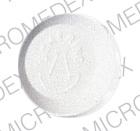Azatadine Dosage
Applies to the following strengths: 1 mg
Usual Adult Dose for:
Usual Pediatric Dose for:
Usual Adult Dose for Allergic Reaction
1 to 2 mg orally twice a day
Usual Adult Dose for Allergic Rhinitis
1 to 2 mg orally twice a day
Usual Adult Dose for Urticaria
1 to 2 mg orally twice a day
Usual Pediatric Dose for Allergic Reaction
<12 years: not recommended
>=12 years: 1 to 2 mg orally twice a day
Usual Pediatric Dose for Allergic Rhinitis
<12 years: not recommended
>=12 years: 1 to 2 mg orally twice a day
Usual Pediatric Dose for Urticaria
<12 years: not recommended
>=12 years: 1 to 2 mg orally twice a day
More about azatadine
- Check interactions
- Compare alternatives
- Side effects
- During pregnancy
- Drug class: antihistamines
- Breastfeeding
Related treatment guides
See also:
Further information
Always consult your healthcare provider to ensure the information displayed on this page applies to your personal circumstances.


